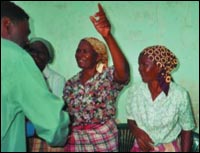
|
Promoting Land Rights in Africa:
How do NGOs make a difference?
Nazneen Kanji, Carla Braga and Winnie Mitullah
|
|
 |
[Download complete document  - 224Kb ~ 1 min (59 pages)]
[ Share with a friend - 224Kb ~ 1 min (59 pages)]
[ Share with a friend  ]
]
|
Executive summary
Over the last 20 years, growing numbers of non-governmental organisations (NGOs) have diversified
from service provision into policy advocacy. They are being credited with considerable impacts on global
processes ranging from economic development to democracy. But are these impacts actually occurring,
and if so, how are they being achieved?
This report investigates the effectiveness of NGOs’ strategies and methods to influence land policy
reform. It is based on a study of seven NGOs promoting land reform and land rights in Mozambique
and Kenya. Through collaborative research in both countries we explored a number of key questions:
- Do NGOs influence policy or are structural, institutional and political constraints too great?
- Should NGOs maximise their own advocacy roles or focus on building the advocacy capacity of less powerful groups?
- Do NGOs have the skills for advocacy work or should they focus on innovation in development interventions at the community level – showing by doing?
- Can NGOs engage with government without compromising their independence?
- Do donors facilitate or constrain the work of NGOs?
- Is it possible to assess the effectiveness of advocacy work?
Methods
There is no doubt that assessing advocacy impact is important to ensure that activities are best aimed at
improving the lives of poor and marginalised groups. It is particularly important that NGOs do take the
time to reflect, particularly in organisations where a culture values action over reflection.
However, assessment too often has a patronising ‘checking-up’ feel about it, is too closely tied to
funding and project cycles, is often portrayed as a complex technical process and assessment criteria
can obscure what is really important. As a result of this research, we suggest a framework for
assessment based on four main areas of impact, each of which can be measured using short and long
term indicators:
- Strengthened civil society organisations
- Consultative government procedures and practice
- Pro-poor changes in policy, regulations and legislation
- Direct benefits to and improvements in living conditions of poor groups
We mainly used semi-structured interviews and in-depth individual and group discussions with
staff in the selected NGOs, and interviewed key informants in other NGOs, government and donor
agencies in each country. We carried out limited fieldwork in communities where the case study NGOs
were active, to assess local relations with and perceptions of these organisations.
Main Findings
While the NGOs selected for this study have had significant impacts on land policy processes, the study
clearly demonstrates the shortcomings of linear models which separate policy making processes from
implementation. Both case studies show that legislation and regulations can be modified, reinterpreted
or simply ignored when it comes to implementation, when local level power relations become critical.
There are two direct implications of this finding. Firstly, building the capacity of community groups to
take informed action is not only important as an end in itself but is also critical to long-term and sustainable
pro-poor policy influence. Secondly, many aspects of laws and policies are actually made during
implementation, with specific situations determining the practice of a law or policy. Monitoring this
process is therefore a key role for NGOs. Despite current shifts ‘upstream’ from service provision to engagement
with policy, the NGOs in the study all feel they need to engage directly with communities and
with their immediate concerns and needs if they are to gain legitimacy for advocacy and monitoring.
Other key lessons for practice include:
- NGOs which can provide well-researched arguments to support pro-poor land rights will increase their policy influence.
- Good NGO leadership and relationships with power holders are important for policy influence. However, the way in which leaders engage with their staff and the relationship between organisational culture and policy influencing work require further research.
- NGOs will have greater longer term impact by building the advocacy capacity of representative organisations of less powerful groups.
- The basis and terms of engagement between NGOs and government need to be made clear in each individual case.
- NGOs need to increase efforts to address gender, class, ethnicity and age inequalities in both internal structures and decision-making, and in their work with communities.
- Donor support for NGOs to work on policy development should include support to NGOs’ important role in building sustainable policy influence from the grassroots.
- Donor funding for advocacy work should have longer time frames and expectations of what can be achieved should be realistic and context-specific.
- Donors should consider funding NGO core staffing and administration to decrease staff stress and facilitate reflection and learning.
- Qualitative assessments of advocacy work, using simple frameworks and informed by local political realities, should supplement more quantitative output-oriented assessment.
- Assessments funded by donors should maximise learning and not be directly tied to funding cycles.
|
[Download complete document  - 224Kb ~ 1 min (59 pages)] - 224Kb ~ 1 min (59 pages)]
|
|






